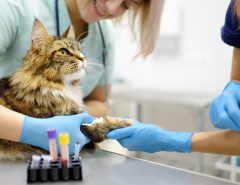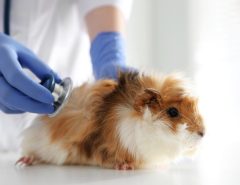As loving pet owners, we all want our furry friends to live long, happy, and healthy lives. Recognizing the warning signs of internal diseases in pets is a critical part of ensuring their well-being. Pets can’t tell us when something is wrong, so it’s up to us to observe them for any changes that could indicate health problems.
Altered Eating Habits
When a pet starts eating less or more than usual, it could be a red flag. Weight loss can be particularly alarming as it may signal conditions such as diabetes or kidney disease. On the other end, sudden weight gain might suggest hypothyroidism or other metabolic disorders.
Changes in Drinking and Urination
Keep an eye on your pet’s water intake and urination. Excessive thirst and increased urination can be signs of diabetes or kidney disease, while less frequent urination might indicate a urinary tract infection or dehydration.
Vomiting and Diarrhea
Occasional vomiting or diarrhea may not be a sign of anything serious, but if it persists, it could point to internal issues. Persistent gastrointestinal symptoms warrant a visit to the vet to rule out conditions such as intestinal parasites or food allergies.
Breathing Difficulties
Labored breathing, coughing, or rapid breathing can be a sign of heart disease, lung problems, or even cancer. Always take breathing changes seriously, as they can quickly become life-threatening.
Behavioral Changes
Any shift in your pet’s behavior should be noted. Lethargy, aggressive behavior, or signs of depression can indicate pain or discomfort potentially related to internal disease. Changes in sleep patterns are also worth mentioning to your vet.
Altered Appearance
Your pet’s coat, stance, or the way they walk can tell you a lot. A dull coat may be a sign of nutritional deficiency or illness. Keep an eye out for lumps, swelling, or persistent itchiness as well.
Routine pet check-ups can often spot the early signs of internal disease before they become more serious. Vets can conduct physical examinations, run blood tests, and check for parasites during these appointments, ensuring your pet remains in top condition.
Gum Color and Oral Health
Healthy gums are usually pink. Pale, white, blue, or yellow gums could indicate serious internal conditions such as anemia or liver disease. Bad breath is also something to watch out for, as it may suggest dental issues or diabetes.
Important Factors for Preventive Health
While watching for signs of potential disease is crucial, preventing these conditions is equally critical. For instance, important pet vaccinations are fundamental for protecting your pets against preventable infectious diseases. These vaccinations prepare their immune system to fend off illness, keeping them healthier in the long run.
Preventing Diseases in Pets
Stopping health problems before they start is a good strategy for keeping your pet healthy. Basic steps like vaccinations, regular vet check-ups, and good day-to-day care are all part of this. Being proactive can cut the chances of your pet getting sick.
-
Stay Up-to-Date on Vaccinations: Make sure your pets get all their shots. This protects them against serious and common illnesses.
-
Regular Vet Visits: Taking your pet to the vet for check-ups can help catch any health issues early before they get worse.
Vaccinations as a Defense Against Illness
Vaccinations teach your pet’s immune system how to fight diseases. Just like people, pets have an immune system that helps keep them from getting sick. When they get vaccinated, it’s like training for their immune system.
-
Building Immunity: Vaccines help your pet’s body learn to defend itself against specific diseases.
-
Long-Term Health: Staying up-to-date with vaccinations can mean your pet will be healthier throughout their life.
By keeping your pet’s vaccinations current and focusing on prevention, you can greatly improve their chances of leading a long and healthy life. Preventive health care means less time worrying about future illnesses and more time enjoying the company of your healthy and happy pet.
Signs that Warrant Immediate Veterinary Attention
In some cases, your pet may exhibit signs that require immediate veterinary care. These include:
-
Seizures or convulsions
-
Unconsciousness or collapse
-
Extreme pain, whining, shaking, or withdrawal
For some health issues, advanced care may be necessary. In cases where surgery is required, consulting with a professional like this vet surgeon can provide the expertise needed for successful outcomes. They can address a variety of conditions, from minor procedures to complex surgeries, ensuring your pet receives the best possible treatment.
How You Can Help Your Vet
You are your pet’s advocate and play a vital role in their health care. Keep detailed records of any changes or symptoms and communicate these to your vet. Timely and precise information can make all the difference in diagnosis and treatment.
Wrapping Up
Pets rely on us to notice when they’re not feeling well and to take action to help them get better. By keeping an eye out for these warning signs and providing proactive care, you can ensure your pet lives a comfortable and healthy life. Remember, early detection and treatment are key to managing internal diseases in pets, so don’t hesitate to seek veterinary care when you notice something amiss. Your attention and care can make all the difference.




